As the final lap of the race for the next Dáil begins, this is Conor McMorrow's A-to-Z on Election 2024 so far.
A is for Announcement
Taoiseach Simon Harris told us for months that it was in his gift to dissolve the Dáil and set the election date. Enter Messrs O'Gorman and Martin. Weeks ago, Green party leader Roderic O’Gorman stole a march on the Taoiseach by announcing his preferred date for the election was 29 November.
On Wednesday 6 November, Tánaiste Mícheál Martin told Virgin Media TV that the Dáil would be dissolved two days later, and the date would indeed be O’Gorman’s preferred date - the 29th.
The Fianna Fáil and Green leaders outpaced Simon Harris in the race to the all-important announcement.
B is for Budget giveaways
Delivered in early October, Budget 2025 was dubbed a 'giveaway budget.’ Corporation tax windfalls bolstered the State coffers, allowing the outgoing Government to announce such goodies as double payments for welfare recipients, and more universal energy credits.
Opposition parties have accused the coalition of trying to buy the election. As those payments arrive in people’s accounts, will the electorate thank the outgoing government parties for them? Or will those parties be left astounded by the taxpayers’ ingratitude when the votes are counted?
C is for Celebrity candidates
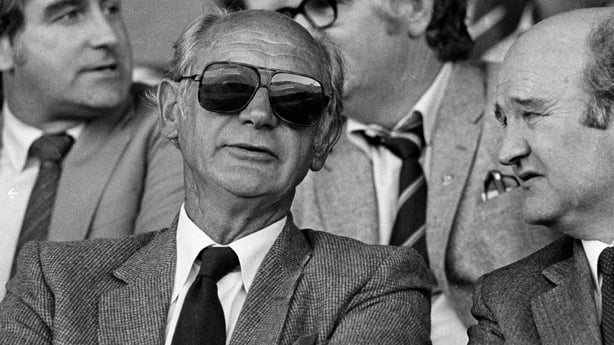
It is 76 years since Jack Lynch was first elected for Fianna Fáil. A winner of six All-Ireland titles with Cork, he was one of the original ‘celebrity candidates,’ and went on the become taoiseach.
The party is continuing the trend this time around. Former TV presenter Gráinne Seoige is making her first foray into politics on the Fianna Fáil ticket in Galway West. While in Louth, former UTV Ireland news anchor Alyson Comyn, a journalist with the Drogheda Independent, is also contesting for the party.
D is for Dynasties
Politics is a family affair, and Election 2024 sees several candidates seeking to emulate a parent who was elected to the Dáil in a previous era.
In Meath West, Aisling Dempsey, the daughter of former Fianna Fáil TD and Minister Noel Dempsey is contesting her first general election. In Dublin West, Fine Gael senator Emer Currie is contesting in the constituency where her late father Austin was a TD from 1989 to 2002.
In Tipperary North, Michael Smith is contesting for Fianna Fáil. He is the son of the former Minister, TD and Senator of the same name.
In Waterford, Fine Gael Senator John Cummins is the son of former Seanad leader Maurice.
In Cork North Central, Independent Ireland’s Ken O’Flynn is hoping to follow in his father Noel’s footsteps and win a Dáil seat. Noel was a Fianna Fáil TD from 1997 to 2011.
New EU Commissioner Michael McGrath’s brother Séamus is expected to retain his Fianna Fáil seat in Cork South Central.
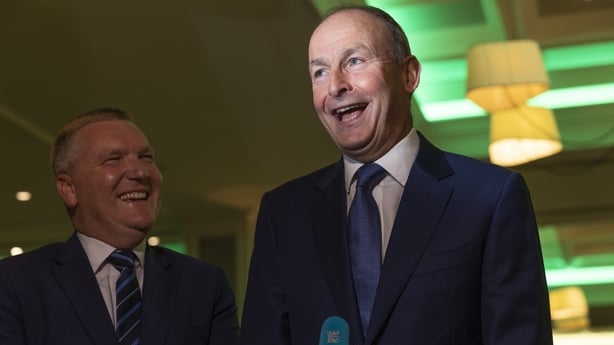
Elsewhere in Cork, the decision by Labour TD Seán Sherlock not to contest this election marks the first time there will be no Sherlock surname on the ballot paper since his father Joe first contested for the Workers’ Party back in 1973.
Seán’s cousin, Senator Marie Sherlock, is running for Labour in Dublin Central.
In Cork East, Mark Stanton, son of retiring TD David, is running for Fine Gael and Deirdre O’Brien, daughter of former TD Ned O’Keefe, is on the Fianna Fáil ticket.
In Kildare South, Senator Mark Wall is seeking to back the seat his father Jack held from 1997 to 2016.
This election also marks the first time there will be no Cowen candidate in Offaly. Ber Cowen started that Fianna Fáil dynasty in 1969, which was retained by his sons Brian and then Barry. Barry was elected to Europe in June.
Meanwhile, veteran TD Éamon Ó Cuív, grandson of Fianna Fáil founder Éamon de Valera, is retiring after 32 years in the Oireachtas.
Dynastic – or sibling – rivalry is also a feature of this election. Veteran Fianna Fáil TD John McGuinness is up against his brother, independent councillor Eugene McGuinness, in Carlow-Kilkenny.
Other siblings running in this election are Aontú candidates. Party leader and outgoing Meath West TD Peadar Tóibín, and his sisters Emer and Mairead, are all running, albeit in different constituencies. Emer Tóibín is on the party ticket in Meath East and Mairéad Tóibín in Dún Laoghaire.
E is for Extra Seats
There were 160 seats in the last Dáil, spread throughout 39 constituencies. In Election 2024, there are 14 more seats up for grabs, bringing the total number of TDs to 174.
Interactive: Election 2024 General Election Constituency Profiles
There are also four extra constituencies, making up 43 different contests on count weekend. 685 candidates have put their names forward to contest this election.
F is for Firsts
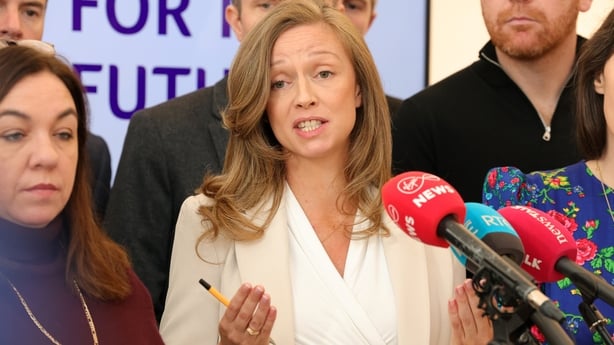
This election marks at least one political first. It’s the first time that one of the party leaders opted not to take part in a major TV debate – as she is about to give birth. Social Democrats’ leader Holly Cairns is due to give birth anytime now, and the Cork South-West TD decided to remain in Cork rather than travel to Dublin for debate with nine other leaders for the Upfront debate on Monday 18 November.
The party’s deputy leader Cian O’Callaghan took her place. Asked by David McCullagh on the Six-One News about the timing of the election coinciding with her child’s arrival, Ms Cairns said, "It’s not ideal. As if my constituency in Cork South-West wasn’t competitive enough, and the new role as leader, I have thrown this into the mix as well."
G is for Gender Quotas
Election 2024 sees the largest ever number of women contesting for Dáil seats. 248 women are running, according to figures compiled by the Women for Election group.
This election is the first time political parties have been subject to a 40% gender quota for male and female candidates. There are now at least two women candidates running in each of the 43 constituencies.
Women for Election says Ireland is 104th in the world for the number of women in parliament. The group advocates for greater female participation in politics, as 50% of the population are women but less than a quarter of politicians in local and national government are women.
H is for Hutch
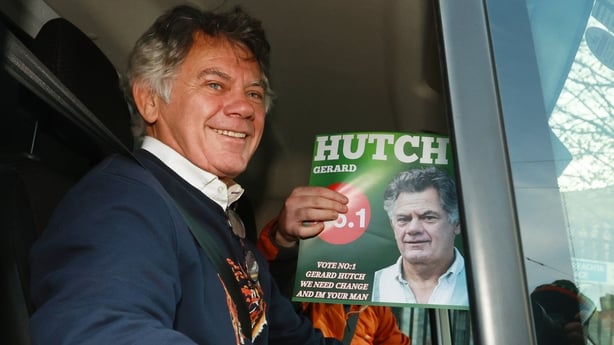
Gerry Hutch has been one of the surprise candidates in this election. He returned to Ireland from Spain in early November where he had been arrested in connection with alleged money laundering offences.
He has previously been described in the High Court as head of the Hutch Organised Crime Gang. He grew up in the north inner city and is contesting for a seat in the Dublin Central constituency as an independent.
I is for Incumbency
Being an incumbent TD is a huge advantage when contesting Dáil elections.
In 2020, 75% of TDs who stood again defended their seats. Analysis carried out by UCD politics Professor Stefan Müller has found the average re-election rate of incumbents since 1937 exceeds 80%.
In other words, eight of ten TDs who ran also got re-elected, placing Ireland among the countries with the highest re-election rates worldwide.
Incumbency could have a significant impact on this election. With 18 of Fine Gael’s 35 TDs retiring, it has a lot of newcomers in the field. Most of them are councillors who won local election seats in June.
It is also an issue for other parties. Sinn Féin’s Kathleen Funchion secured a massive 17,500 votes in 2020. She was elected an MEP in June. Is her vote, and that of other TDs-turned-MEPs – like Fianna Fáil’s Barry Cowen - a personal vote, or will it transfer to the new candidates from their party on the ballot paper?
And what will happen following the departure of veteran Social Democrats TDs, and high vote-getters, Roisín Shortall and Catherine Murphy?
J is for John McGahon
Sinn Féin found itself at the centre of a political storm before the election campaign kicked off linked to controversy over the departures of Laois TD Brian Stanley, and Kildare South TD Patricia Ryan in recent months – not to mention Senator Niall Ó Donnghaile, last December.
The stories ensnared the party for week after week.
In the heat of the election campaign, it is Fine Gael that has a candidate problem. Six years ago, Fine Gael election candidate in Louth, Senator John McGahon, was involved in a late-night street fight outside a Dundalk pub. The Senator was found not guilty of assault causing harm to Breen White in a criminal trial in 2022.
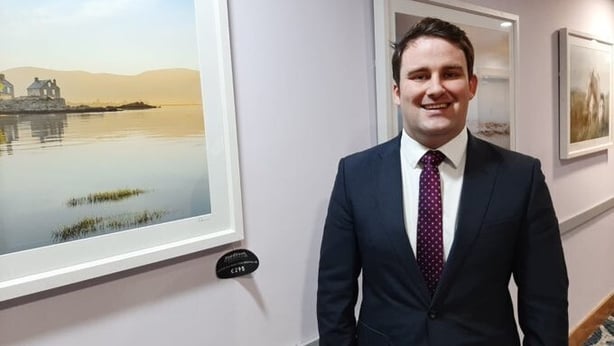
However, Mr White took a civil action, suing Mr McGahon for assault and battery. Mr McGahon was found 65% liable for damages in July, and ordered to pay €39,000 to Mr White.
On Sunday 17 November, the Sunday Times published an interview with Mr White, accompanied by photos of the facial injuries sustained.
Other political parties have now said the senator is not a suitable general election candidate. Fine Gael leader Simon Harris has stood by his candidate and argued that the standard for suitability for contesting on the party ticket should be based on the criminal and not civil courts.
K is for Kingmakers
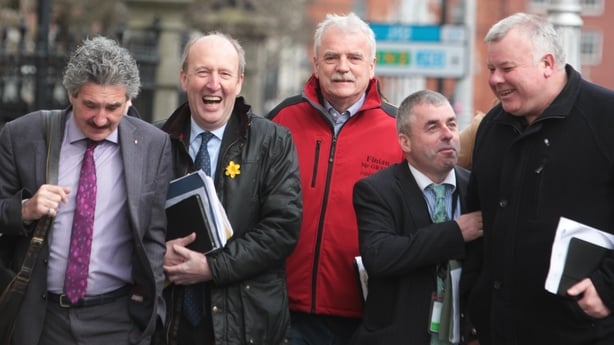
With 174 seats in the 34th Dáil, it will take 88 seats for a party to win a majority on its own. Before a vote is cast, none of the parties are fielding enough candidates to do so.
No matter what the breakdown of seats won by the three largest parties is after the votes are counted, they are each going to need a coalition partner or partners to govern.
As the counts unfold, it will become clear who will be the kingmakers. Will the Greens have enough seats to return to Government? Almost a decade after it was founded, has the Social Democrats' time to enter government arrived?
Or could a resurgent Labour come into the reckoning?
Despite overtures from Fianna Fáil and Fine Gael, Labour leader Ivana Bacik has said her party wants a Green-Left Alliance. Could the more left-leaning parties such as People Before Profit-Solidarity come into the mix? Or will Aontú increase its TD count to become players in the next coalition?
Or will it all come down to two big parties, perhaps will a topping of independents?
L is for Law and Order
In a campaign where housing and the cost of living have been the dominant themes, the issue of law and order has been the source of most political sideswipes.
In a social media post a week into the campaign, veteran Fianna Fáil TD Willie O’Dea launched a scathing attack on Fine Gael’s Helen McEntee, describing her as "the worst Minister for Justice in the history of the State."
He said he was "absolutely amazed" to see her "trying to position herself and her party as the party of law and order and security."
His comments came after testy exchanges between Ms McEntee and Fianna Fáil’s justice spokesperson Jim O’Callaghan on Prime Time.
Mr O’Callaghan said most of the proposals introduced by the Fine Gael minister had been suggested by him. She responded, "women all over the country know what it’s like when men try to take credit for your work."
M is for Mica
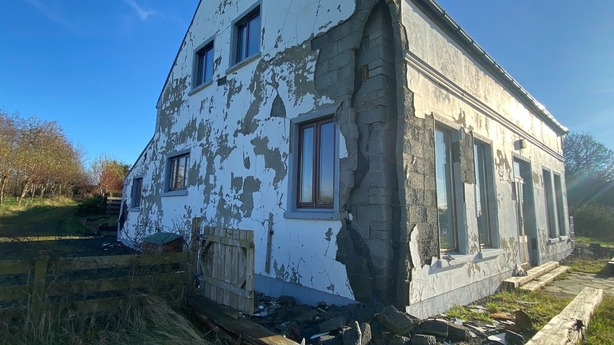
The controversy surrounding defective building blocks containing mica is still to the fore in Donegal.
As people’s homes are crumbling away before their eyes, a new political party has been set up – the 100% Redress Party.
It had four candidates elected to Donegal County Council in the local elections in June. Now, Charles Ward, a defective concrete block homeowner, is running in the general election.
As the party’s candidates collectively garnered over 7,000 votes in the locals, it is in with a shout of winning a Dáil seat.
N is for Nicknames
It wouldn’t be an Irish election without some candidates having their names listed on the ballot paper with their nickname included. Johnny ‘Porridge’ O’Connor and Marie ‘The Shamrock’ Fahy have previously been elected as councillors.
In this election, Peter ‘Chap’ Cleere is running for Fianna Fáil in Carlow-Kilkenny. He is known as ‘Chap’ to distinguish himself from the other Peter Cleere’s in his lineage.
The Labour party candidate in Tipperary South is Michael ‘Chicken’ Brennan, who has been known as that since he was four years old.
He explained during the local elections, "my first cousin, also called Michael Brennan, was called Foxy Chicken because they used to keep turkeys. So, to distinguish the two of us, he was called Foxy Chicken and I was called Chicken."
O is for O’Leary
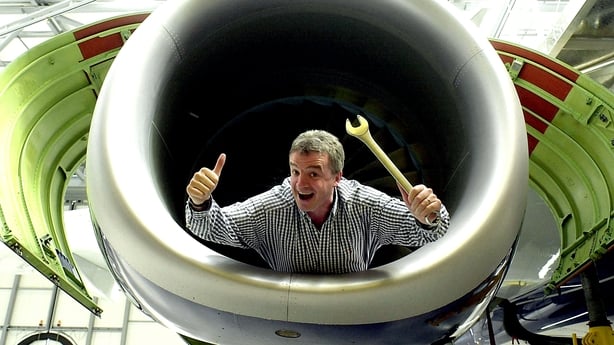
Ryanair CEO Michael O’Leary threw a spanner into the early days of the Fine Gael campaign when he made comments about teachers at an event to endorse Longford-Westmeath candidate Peter Burke.
Mr O'Leary said "the Dáil is full of teachers. Nothing wrong with teachers, I love teachers, but I wouldn't generally employ a lot of teachers to go out and get things done."
The comments were criticised by opposition parties and teachers’ unions.
Fine Gael was slated, as some party supporters appeared to laugh at the Ryanair CEO’s jibe on the night. Mr O’Leary doubled down on what he said, but Fine Gael leader Simon Harris described the comments as "crass and ill-informed," adding he was "pretty annoyed about it".
The storm did quickly blow over, but it was a far from ideal start to Fine Gael’s campaign.
Then - come the start of the all important final week of the campaign - the party leader himself had to apologise. Footage of an interaction he had with disability worker Charlotte Fallon in a supermarket in Kanturk, Co Cork, went viral.
Simon Harris said that there was no excuse, after he was seen walking away and not giving her enough time, when she spoke to him about supports for disability and carers. Mr Harris subsequently spoke with Ms Fallon over the phone, but the encounter clocked up millions of social media views.
P is for Promises
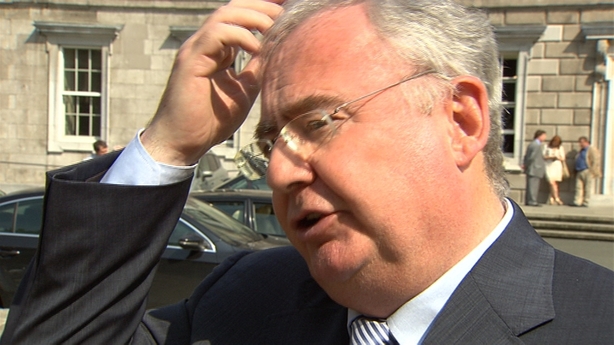
This election campaign is likely to be remembered for the litany of promises made by each party. "Auction politics’ is back with a bang.
Interestingly, none of the parties have put forward enough candidates to win an overall Dáil majority. They all know that some form of coalition government is inevitable when the votes are counted. So, their promises can be as audacious as they like now - safe in the knowledge that they can blame government formation talks for many subsequently unmet promises.
Maybe these promises should be viewed with an infamous line from former Labour leader, Pat Rabbitte line, in mind. Probed by broadcaster Seán O’Rourke about promises made during the 2011 general election being broken, Mr Rabbitte responded, "isn’t that what you tend to do during an election?"
Q is for Quiz Question
It might be a quiz question in years to come "which Dáil constituency had no sitting TDs based within its boundaries in Election 2024?"
The answer is the new constituency of Wicklow-Wexford. Born out of the Electoral Commission review carried out in 2023, none of the outgoing TDs in the existing constituencies of Wicklow and Wexford are based in the area.
It will return three new TDs.
R for 'Returnees to the fold?'
A sizeable number of former TDs are seeking to return to the fold of Leinster House.
Among them are Kevin ‘Boxer’ Moran (Independent in Longford Westmeath), Independent Tom McEllistrim (Independent Ireland in Kerry), Noel Rock (Fine Gael in Dublin North West), Ruth Coppinger (People Before Profit-Solidarity in Dublin West), Kate O’Connell (Independent in Dublin Bay South), Alan Shatter (Independent in Dublin Rathdown), Clare Daly (Independents 4 Change in Dublin Central), Pat ‘The Cope’ Gallagher (Fianna Fáil in Donegal), Eamon Scanlon (Fianna Fáil in Sligo), Eugene Murphy (Independent in Roscommon Galway), Mick Wallace (Independents 4 Change in Wexford), Joe Behan (Independent in Wicklow) and Seamus Healy in (Tipperary South for Workers and Unemployed Action).
S is 'Sham fights or bona fide bust ups?'
"Pantomime politics in the run up to Christmas" is how former minister Alan Shatter described the various spats between Fine Gael and Fianna Fáil during this campaign. Sinn Féin’s Louise O’Reilly was among the first to label them ‘sham fights.’
The niggle between the two parties that have been in coalition together is not actually new.
A tip of the hat goes to Sandra Hurley from RTÉ’s political staff for digging up press releases from the 2020 campaign, where Fine Gael’s Paschal Donohoe attacked Fianna Fáil for having an "uncosted fictional manifesto."
He said it would be disastrous for the country, before Fianna Fáil hit back. That was after the Confidence and Supply agreement between the two parties, and just before they went into coalition together.
T is for ‘The Cope’
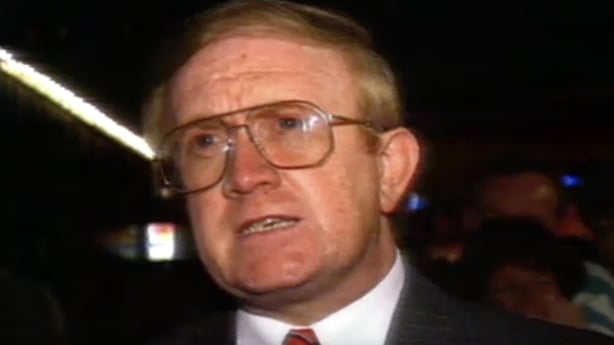
2024 has already seen the return of one septuagenarian politician in what was described as the greatest political comeback in history. That was in the United States, but we could see another one closer to home.
Pat ‘The Cope’ Gallagher is 76 years old. First taking a seat in 1981, he was elected a TD for Donegal in nine general elections and as an MEP in three elections. He lost his Dáil seat in 2020 but he’s now back on the Fianna Fáil ticket.
It will be some political comeback if he can regain his seat in this election.
U is for Up sticks and go
A range of candidates in this election have upped sticks and left political parties to contest under a different banner. Among them is Shay Cullen a Fine Gael councillor in Wicklow. He is contesting as an independent after losing out on a Fine Gael party general election nomination.
In Mayo, former Fine Gael councillor Patsy O’Brien from Claremorris is running as an independent. Former TD Eugene Murphy, a Fianna Fáil senator until a few weeks ago, is contesting as an independent in Roscommon-Galway.
Another is Michael Sheehan, a Fianna Fáil councillor for decades, who is standing as an independent in Wexford. Another former Fianna Fáil councillor, Noel Thomas, is running as for Independent Ireland in Galway West.
Two Sinn Féin TDs, who had high-profile departures from the party recently, are also standing as independents – Brian Stanley in Laois and Patricia Ryan in Kildare South.
V is for Variety
Opinion polls and elections over the last decade have shown the electorate is volatile and difficult to predict. The old ‘two-and-a-half-party' system is gone, and everything points to a variety of independent candidates getting elected.
Some independent TDs have built strong political machines within their constituencies, where they have a number of councillors on their team. Among them are the Healy-Raes in Kerry, and Mattie McGrath and Michael Lowry in Tipperary South.
They are all aiming to hold their seats.
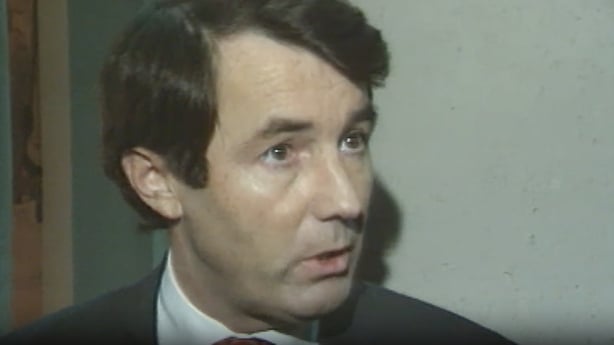
If opinion poll trends are borne out on count day, it is likely to be a good day for independent candidates in constituencies dotted all over the country. Watch out for possible breakthroughs for Independent Ireland’s Shane P O’Reilly in Cavan Monaghan and Declan Geraghty in Galway East; and Gillian Toole an independent councillor in Meath East. Also, John Lyons or Barry Heneghan in Dublin Bay North.
Outgoing TDs such as Independent TD Cathal Berry from Kildare and Independent Ireland’s Richard O’Donoghue in Limerick County are also expected to be returned.
There’s certainly variety from the hard-left and hard-right when you glance through the list of candidates running across the 43 constituencies. One party that is certainly adding variety to the political landscape is the Party for Animal Welfare.
That party is similar to a political movement on the continent – the Party for the Animals - that has had MEPs elected to European Parliament. Molly Candon is running for the Party for Animal Welfare in Sligo Leitrim and and Gerben Uunk is its candidate in Limerick County.
W is for Waste of Public Money
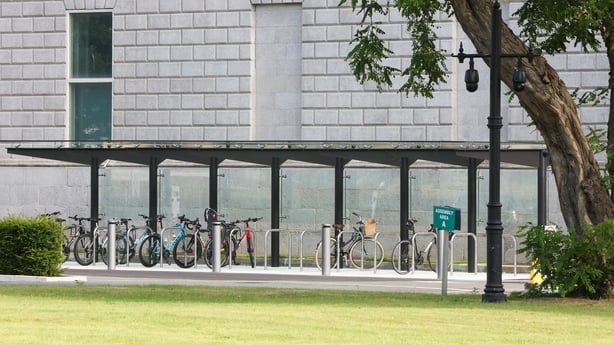
Election 2024 has arrived just after it emerged that €336,000 was spent building a bicycle shelter at Leinster House. A staggering €1.4million was paid for a security office at the Department of Finance. That’s not to mention the ongoing cost overruns at the National Children’s Hospital. The parties have been outdoing each other with spending proposals in their manifestos. Do the finances stack up or do they point to more waste of public money?
John McHale, Professor of Economics at the University of Galway, and former chair of the Irish Fiscal Advisory Council, gave a damning assessment of the financial promises. He said "there is an air of unreality to the campaigns so far. So, we see this spiral of competitive bidding for votes."
X is for X
X is the name for the social media platform formerly known as Twitter (thanks to Elon Musk’s takeover of Twitter in 2022.)
The platform probably does not have the same influence as it would have had in previous elections, but party apparatchiks still put huge efforts into tweeting during big set-piece moments like televised leaders’ debates.
On the night of the recent RTÉ Upfront debate, political commentator David McCann deftly tweeted: "Well done to all the party activists. That’s some shift all of you have put in tonight tweeting madly about your leaders being amazing."
Y is for Young Adults living at home
According to the 2022 Census, 522,486 adults are still living at home with their parents – up 14% on the 2016 census. 41% of people aged between 18 and 34, and 33% of people aged between 25 and 29 live with their parents.
Many of these young people are not there out of choice, but blame high rents, high cost of living, and rising house prices for leaving them ‘stuck’ at home.
Described by some as the locked-out generation – they, along with their parents, make up a sizeable chunk of the electorate. They will certainly be looking at what each party is promising to do with the housing crisis before casting their votes.
Who will attract their votes? That may define the result.
Z is Zeitgeist
Capturing the zeitgeist is a political holy grail for political parties during a general election campaign.
The leaders have all engaged in high energy tours around the country. In an election campaign that is widely viewed to have been devoid of standout moments – has anyone – or can anyone - really captured the zeitgeist?





